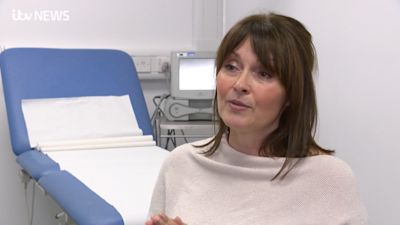Stratford mum sent home with indigestion medicine after heart attack misdiagnosed

ITV News Central journalist Charlotte Horner spoke to Sally Bee who is raising awareness of women's risk of heart attacks and conditions
A woman who has survived five heart attacks - and on one occasion was sent home with indigestion medicine - is warning of a gender gap in the diagnosis of heart conditions.
Coronary heart disease is usually what causes a heart attack and in the UK it kills twice as many women as breast cancer. However, there's a misperception that it's a man's disease.
Sally Bee from Stratford-upon-Avon was a busy mum of three in her 30s when she had her first of five heart attacks.
She recalls feeling a sense of 'impending doom' and crippling chest pain before collapsing on the floor whilst at a child's birthday party.
"You get this sweep of impending doom. If ever you're about to get ill with flu or something and you just have a creepy crawly feeling around your body and you think 'I'm coming down with something', it's like that magnified a million times and so quick", says Sally.
"I've had three babies and I'd rather do that any time"
"Then the pain hit. I've had three babies and I was quite brave and I'd rather do that any time than the heart attack, so that's the sort of pain I was looking at."
"It's just the most awful, horrible feeling in the world", she adds.
Sally's heart attacks are caused by a condition called spontaneous coronary artery dissection - often referred to as SCAD - which occurs when a blood vessel supplying the heart tears.
Although her condition is rare, the initial misdiagnosis of women following a heart attack is not.
Heart research charities say a lack of awareness from medics and the public means many women are 'dying unnecessarily' from heart conditions.
Research from the British Heart Foundation shows women are 50% more likely than men to be misdiagnosed following a heart attack - and an incorrect initial diagnosis means a 70% higher risk of death after 30 days compared to someone who has a correct diagnosis.
Sally says after her first heart attack because she was so young, medics didn't take her seriously and she was sent home with indigestion medicine.
"They thought it was an indigestion problem"
"My ECGs were showing abnormalities, but the on-call doctor still didn't believe it just because he was looking at me saying 'you don't look like someone who would have a heart attack'", explains Sally.
"I was 36 at the time and fit and busy, no I don't look like someone who is having a heart attack, but the ECG was saying this woman is having a heart attack", recalls Sally.
"So that night I was actually sent home with indigestion medicine, they thought it was an indigestion problem", she says. "That night all night I was up with terrible chest pain, so all night that artery was dissecting."
Signs and symptoms of a heart attack
Chest pain - a feeling of pressure, heaviness, tightness or squeezing across your chest
Pain in other parts of the body - it can feel as if the pain is spreading from the chest to the arms (usually the left arm, but it can affect both arms), jaw, neck, back and tummy
Sweating
Shortness of breath
Coughing or wheezing
A feeling of 'impending doom' or anxiety
Feeling sick or being sick
Sally has a very positive relationship with her cardiologist, Professor Francisco Leyva-Leon, at The Queen Elizabeth Hospital in Birmingham.
She says it's important for someone with a heart condition to find a cardiologist they can trust and call upon if something doesn't feel right.
"We tend to think that women, in particular young women, don't suffer heart disease, but of course, we do see it", says Professor Leyva-Leon.
Heart attacks and the menopause
"It is slightly less common in women than in men but certainly towards the ages of the 40s, 50s, 60s the risk is about the same actually", he explains.
The risk of a heart attack increases during and after menopause as a woman's body gradually produces less of the hormone oestrogen.
This can result in coronary arteries narrowing as the hormone would previously protect the lining of the blood vessels from a build-up of plaque.
"In post-menopausal women, the death rate from coronary heart disease is actually greater than other conditions such as breast cancer for example, so there is a misconception", adds Professor Leyva-Leon.
Sally is urging other women to know the symptoms of a heart attack, eat healthily, monitor their blood pressure and check their cholesterol levels.
Recent research from Heart Research UK revealed that three-quarters of women don’t realise that coronary heart disease claims twice as many lives as breast cancer each year in the UK - and two-fifths of women have never had their cholesterol checked.
"I respect my body fully that it supported me through these events"
Sally has an incredibly positive outlook and she says although her heart has been through trauma, it's in "pretty good shape".
She says she has always exercised and eaten healthily and if she hadn't she might not have survived the heart attacks.
"That's because I do everything to look after it", she says. "I walk every day, I eat for health all the time, I respect my body fully that it supported me through these events."
"The problem that I have is when an acute situation arises when I get chest pain and I'm not taken seriously because I am a woman, relatively young and I look fit and well and I don't tick any of the boxes for a heart attack"
"That would be my downfall if something was to go terribly wrong and it has, I've been misdiagnosed many times".